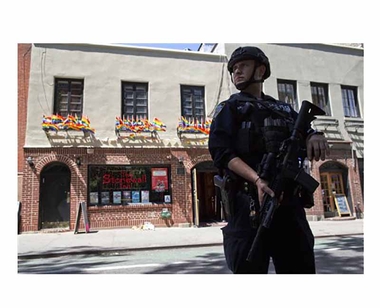Gay clubs: Patrons treasure a place to feel safe, be oneself

NEW YORK (AP) — Like many gay men across America, Jamie Brown has treasured memories of nights spent reveling at a gay club, a boisterous community gathering place where he could feel safe and be himself. He remembers it as a sanctuary.
After the nightclub massacre in Orlando, Florida, "it just won't be the same," Brown wrote in an emotional Facebook post. "The sanctuary has been defiled."
Sunday's attack on the Pulse nightclub, in which 49 people were killed and gunman Omar Mateen died in a gun battle with police, prompted an outpouring of reminiscence and reflection on the vital roles that such clubs have played for many lesbians, gays, bisexuals and transgender people across the U.S.
"Clubs are terribly important to the LGBT community," said Ken Darling, owner of the Minneapolis club LUSH.
"It's where we can be ourselves, develop relationships, be with your community," he said. "It's where our history is."
Indeed, one of pivotal moments of the gay-rights movement revolved around a gay bar in New York City, the Stonewall Inn. A police raid there in 1969 led to violent street riots that emboldened gay activists nationwide.
After the Orlando shooting, clusters of flowers were laid outside the Stonewall's door. Among them was a bouquet of white roses, accompanied by this message: "Never stop dancing."
The club that holds such a fond place in Jamie Brown's memory is called Hula's, in one of Honolulu's edgier neighborhoods. He was stationed in Hawaii with the Army two decades ago as a 21-year-old, in an era when being outed as gay would lead to ouster from the military.
"I imagine that a lot of young gay people could feel the same way about their own regular weekend hot spot as I did about Hula's," Brown wrote in his post. "It's where you go when you don't want to lie... It's where you go to connect, to experience community, forget your secret, and to combat the isolation that a secret of that magnitude can cause."
Now 42, Brown lives in Columbia, South Carolina, and works as a brain-wave analyst for a hospital system. Two years ago, he married his longtime partner; they go out to clubs infrequently, usually for special occasions.
"When we do go, you still have that nostalgia," he said.
Paul Guequierre, now 38 and working for the American Constitution Society in Washington, D.C, says he has vivid memories of his first visit to a gay bar as a 21-year-old college student in Milwaukee.
"It was so exciting," he said. "You walk into a club as a young gay man, barely out of the closet, and see all these other people who were just like you, and you felt this sense of community that you didn't know existed."
That communal sprit was especially powerful at holiday parties, said Guequierre, recalling times when he would have Thanksgiving dinner with his family in a small town about an hour from Milwaukee, then drive back to the city for the nighttime revelry at a club.
In Madison, Wisconsin, members of the LGBT community still harbor fond memories of the Hotel Washington, a building housing a gay bar, dance club, restaurant and music hall that burned down in 1996.
"We still miss it," said Michael Bruno, 60, who sometimes served as a master of ceremonies there. "I don't think the community has ever rebounded from its loss."
There's a Facebook page devoted to memories of the place. A reunion picnic is scheduled for this August.
"It was such a wonderful, safe place," said Bruno. "Everyone was welcome — no one was made to feel ostracized."
Across the country, many gay bars served as venues for vigils or commemorations honoring the victims of the Orlando attack.
At LUSH in Minneapolis — where weekend brunches rival drag performances as favored attractions — patrons were brimming with emotion on Sunday as details of the Orlando shooting emerged.
"It was exactly the right place to be — in my bar with all the people I care about," said Ken Darling. "There was singing and laughing. There were tears and hugs of love, not tears and hugs of fear and foreboding."
Nonetheless, the attack was sobering, he said.
"We in the LGBT community have had to live with this threat of random violence forever," he said. "We've had a lull where we didn't have to think about it, and then something like this happens and we're reminded what's out there — an ideology of hate that's directed toward us."
Prior to the attack on Pulse, a handful of other U.S. gay bars have been targeted, including Neighbours, a popular gay nightclub in Seattle. It was packed with New Year's Eve revelers on Dec. 31, 2013, when a man poured gasoline on a carpeted stairway and set it ablaze. No one was injured; Masub Masmari was sentenced to 10 years in prison for arson.
Robert Matencio, who works as a host at Neighbours, said the club opened in 1983.
"For gays and lesbians, before social media and the internet, we were forced to build community in person, and one of the most natural places for us to congregate are the nightclubs and bars," he said. "It's a place to let loose."
___
Associated Press writer Phuong Le in Seattle contributed to this report.
DAVID CRARY, AP National Writer. Copyright 2016 The Associated Press.
All rights reserved. This material may not be published, broadcast, rewritten or redistributed.
The Gayly - 6/13/2016 @ 4:58 p.m. CDT





